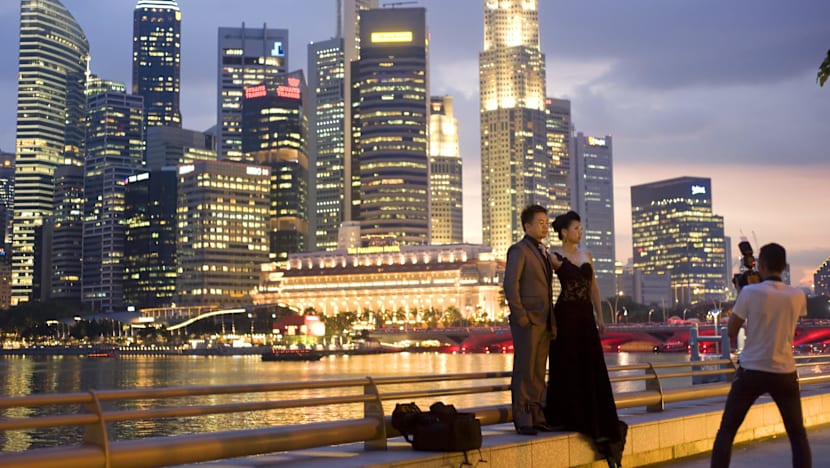Couples face wedding chaos as illegal foreign vendors pull out; local firms want tighter checks
The responsibility also lies with couples who hire foreigners to illegally work at their weddings, said a wedding photographer.

Wedding photographer Annabel Law (right) at a shoot. (Photo: Annabel Law Productions)

This audio is generated by an AI tool.
SINGAPORE: When engaged couple Kevin and Rachel visited a local wedding fair to pick vendors for their ceremony, they chose a Taiwanese bridal studio because it offered the look they wanted at a relatively low price.
They paid S$4,888 (US$3,700) for 10 hours of photography and videography, three gowns and two suits, and hair and make-up services for their wedding in Singapore in November. A local studio would have charged twice as much, said Rachel.
"If you walk one round around the fair and then you ask (for) all the prices, it's quite obvious that you would pick the ones with lower prices," she said. "We didn't consider that it might be because they are doing it illegally."
The Taiwanese studio's presence at the fair was in fact "misleading", said Rachel. "You expect that if they are having a fair (booth) in Singapore, that they will be able to fulfil their duties and have the relevant work permits in Singapore."
The couple, who asked not to be identified by their real names, were dealt a blow when the Taiwanese studio withdrew from their contract in September, after Singapore published an advisory warning foreigners against illegal provision of wedding services.
The advisory, issued by the Ministry of Manpower (MOM) and Visual, Audio, Creative Content Professionals Association (VICPA), said MOM had received information about companies engaging foreign freelancers to provide photography, videography and make-up services for weddings.
Foreigners on tourist or student visas are not allowed to do such work and companies cannot engage them or promote their services, the advisory stressed. Those found working in Singapore without a valid work pass can be jailed for up to two years and fined up to S$20,000.
The Taiwanese studio told Kevin and Rachel they were not prepared to risk the penalties, and the couple was left scrambling to find a local replacement at short notice.
MOM said that from 2021 to 2024, it received around two complaints annually about foreigners working illegally in wedding-related services, and followed up on those cases.
But according to wedding industry insiders, the practice is more common than that figure suggests. And while they welcomed the advisory, they also told CNA that much more can be done to protect local businesses from illegal foreign competition.
In a statement responding to queries from CNA, VICPA said the issue of foreign creative freelancers working in Singapore without valid work passes has become increasingly visible in recent years.
This is especially as social media has allowed foreigners to advertise and take on projects directly.
“While there are no exact figures, feedback from our members suggests that such cases have grown in both scale and scope across the creative sectors,” said VICPA.
“What used to be isolated cases have become a noticeable and persistent trend, particularly in photography, videography, make-up, design, and event-related services.”
VICPA said it was aware of several customers who have already been affected by last-minute cancellations by foreign freelancers, resulting in couples or organisers having to secure replacements at higher costs.
RIVALS COMING "FAST AND FURIOUS"
The practice of hiring foreign vendors for local weddings has been around for a long time, said Ms Tan Weiwei, 37, who was a wedding planner for more than a decade until the COVID-19 pandemic.
After the recent advisory, couples who hired foreign vendors for their weddings were "frantically" looking for local replacements, said Ms Tan, who now runs online wedding industry publication Wed&.
"Local boutiques who have been able to provide all-in-one services at competitive prices are also affected as they might have been using foreign vendors from neighbouring countries who are willing to be paid lower (fees) for their work," she said.
Wedding photographer Annabel Law, founder of Annabel Law Productions, said that by early October, she had received about 200 calls from couples looking for another photographer after their foreign vendors pulled out of their weddings because of the advisory.
Like Kevin and Rachel, lower costs are what motivate most couples who choose foreign vendors, said the wedding industry veterans.
Ms Law said that foreign vendors in Singapore can charge as little as S$300 for photography and videography on the wedding day, while local vendors charge from a figure in the upper S$3,000 range to S$6,000.
"We are unable to compete with the prices and the standard of living that the foreigners have in their own countries," she said, adding that the difference in economic levels allowed them to charge lower fees.
"The market is very saturated already. And now, if we add in the foreigners, we are dying," said the 33-year-old.
Low prices by foreign competitors have kept Ms Law's own rates constant for the past four years, although she would prefer to increase them by 5 to 10 per cent each year. This also slows career progression, she said.
When Ms Law got her start in the business as a teen 17 years ago, she charged S$1,800 for photos and videos on the wedding day. Now, an associate in her firm charges S$2,100 for the same – a S$300 increase over 17 years.
Ms Law said that the situation in fact improved during the COVID-19 pandemic, when heightened border controls meant foreign vendors could not enter Singapore as easily.
"In the last two years, the foreigners came back, and they are very aggressive," she said. She added that when she sees foreign wedding photographers advertise services in Singapore on social media, she reports them to MOM.
Ms Hellen Lie, founder of wedding planning and decoration firm Rosette Designs, said that competition for wedding planning is also "coming fast and furious" from Malaysia.
"They can easily plan and contact the vendors and do (the) site visit, as the proximity is near," said Ms Lie, 42, who has been in the industry for 13 years.
Her firm's wedding decoration services are not as badly affected because venues like hotels require permits for decorations, and this means they have to work with Singapore-based decoration companies, she said.
Ms Lie was worried that the completion of the Johor Bahru-Singapore Rapid Transit System (RTS) Link would create an "influx of overseas freelancers" coming to Singapore. The RTS Link is targeted to start service in December 2026.
Heeding the advisory, her own wedding planning firm stopped engaging foreign vendors and deterred clients from doing so, she added.
VICPA said that local freelance creative professionals have also raised concerns about the broader impact on their industry’s sustainability and professionalism.
“These include lost job opportunities, financial strain, and frustration that their contributions through MediSave, taxes, insurance, and legitimate business overheads, are being undercut by individuals who do not operate under the same obligations,” said VICPA.
The significantly lower fees charged by foreign freelancers may appear attractive in the short term, but “ultimately distort the market, erode client trust, and make it harder for legitimate local professionals to maintain fair pricing and service standards”.
The association also said that without proper regulation or accountability of foreign freelancers, customers risk poor service delivery or even fraud, with limited recourse if the freelancer has left Singapore.
In contrast, local freelance creatives with verified credentials bring “experience, proper equipment and a commitment to professional standards”.
MALAYSIAN PHOTOGRAPHERS HOPE FOR EASIER PERMIT PROCESS
CNA reached out to several Malaysian freelance photographers and studios affected by the recent advisory, with some reporting over 10 booking cancellations scheduled through the end of 2025.
A 29-year-old freelance photographer from Johor, who wanted to be identified only as Ms Nabila, said that her business has been impacted since she has been regularly engaged by Singaporean wedding companies for over a year.
Since the advisory was announced last month, Ms Nabila has faced more than 10 cancellations for events booked by Singaporean wedding companies scheduled through the end of this year.
Ms Nabila shared that wedding companies that engaged her had told her that they could not afford the “minimum pay of about S$3,000” to hire foreign freelancers. This refers to the S$3,300 qualifying salary for S Pass holders, according to MOM guidelines.
These companies had to find replacement photographers based in Singapore to avoid penalties imposed by MOM, Ms Nabila added.
“I hope I get to shoot in Singapore again and that the process to obtain a permit becomes easier,” she told CNA.
SBXS, a photography studio based in Kuala Lumpur that serves Malaysian couples living in Singapore as well as other Singaporean clients, expressed the same concerns.
The company offers packages starting from around RM3,000 (US$709) for events, offering photography and videography services.
“We understand that the law is meant to protect local (Singaporean) vendors but it does affect couples that have planned (their photoshoots) in advance,” said Ms Anggun, a sales and marketing member at SBXS.
Ms Anggun shared that most of their clients have been understanding of the permit and logistical challenges, with many of them deciding to do their pre-wedding shoots in other parts of Malaysia, such as Johor Bahru, since SBXS does not employ Singaporean photographers.
“We hope that there can be a solution, perhaps a special permit or some form of collaboration, as we should support each other rather than compete."
“At the end of the day, we just want couples to have beautiful memories no matter where the wedding takes place,” she said.
Another wedding photographer and founder of a Kuala Lumpur-based studio, who only wanted to be identified as Mr Hafiz, said he has fortunately not been impacted much by the new advisory.
“The last time I shot in Singapore was in January this year and my next scheduled shoot there is in June next year, so I am not immediately affected at the moment,” he told CNA.
“I am not taking any immediate action yet but I am starting to research on how to get licensed and work legally in Singapore, and whether it is worth pursuing,” he added.
According to Mr Hafiz, 95 per cent of his clients are from Malaysia, though he typically handles four to five bookings annually for shoots in Singapore.

NO WORK PASS EXEMPTION
CNA asked MOM what visa arrangements would allow foreigners to legally provide photography, videography and make-up services for the length of a wedding in Singapore, just one or two days.
In response, the ministry said that in general, foreigners must possess valid work passes, and businesses and individuals engaging foreigners to work in Singapore must ensure they hold valid passes before starting work.
This is not a new requirement, it added.
MOM said it considers multiple factors when assessing whether a business activity is eligible for a work pass exemption. These include whether the activity is sporadic and short-term in nature and whether it impacts local employment opportunities.
However, MOM's webpage on activities eligible for the exemption explicitly states that "business-to-individual services such as videography or photography for weddings" are excluded.
While weddings and events are the most common areas where such issues occur, VICPA said it has also received reports of similar practices in corporate content production, digital marketing and food and beverage-related campaigns.
In its statement, VICPA stressed the need for a clearer understanding of work pass rules and stronger support for local freelance creative professionals who comply with them.
It also recognised that "legitimate international collaborations" remain important for creative exchange.
"Companies can continue to engage critical foreign talents – such as creative leads, models, or specialised production personnel – through proper work pass channels or registered agencies that ensure compliance with MOM regulations," said VICPA.
It added that the recent advisory does not affect work done overseas, such as through online platforms.
Under MOM regulations, a worker coming in on an S Pass would need to earn at least S$3,300 to S$4,800 a month, depending on their age, and is subject to the foreign worker quota and levy.
When Ms Tan was a wedding planner, she would suggest foreign wedding photographers to clients if they fit the couple's aesthetic and budget.
"How they handle their entry into Singapore, this part we didn't really pursue. Because the contract per se is between the couple and the vendor," she said.
Ms Tan said that after the recent advisory, some wedding planners received requests from couples asking them to apply for work passes for their foreign vendors.
Wedding planners in Singapore are like "micro-businesses" with few employees, said Ms Tan. This makes it difficult for them to sponsor S Passes under the foreign worker quota. "So they are in a very tricky situation," she said.
While cost-cutting is the most commonly heard reason for hiring foreign wedding vendors, some couples choose them for aesthetic or cultural reasons, or might hire them for a destination wedding held in Singapore.
In such cases, customers could be paying a premium to fly their preferred foreign wedding vendors in, said Ms Tan.
These scenarios mean there could be a gap between client demand for foreign wedding vendors and what is possible under the legal framework for work passes, she wrote in a recent article for Wed&.
TAKING CUSTOMERS TO TASK
But for the local wedding industry, what weighs most heavily is the threat to their businesses.
For a start, Ms Law hoped wedding fairs could carry out due diligence by ensuring that foreign vendors are not marketing or selling illegal services for weddings held in Singapore.
Both Ms Law and Ms Lie also suggested that wedding venues act as gatekeepers by checking the identifications of individuals entering the venue to work on the wedding day.
This could mean asking for National Registration Identity Card (NRIC) numbers, Foreign Identification Numbers (FIN) or Unique Entity Numbers (UEN) for businesses.
Going further, Ms Law saw the responsibility as lying not just with the foreign vendors but the couples who engage them in the first place.
"They are not afraid to destroy someone else's rice bowl," she said, referring to the livelihoods of local wedding photographers like herself.
While she was happy about MOM and VICPA's advisory, she felt that efforts should not stop at consumer education and penalties for the foreign vendor.
"I think there should be a fine for couples who want to go ahead, because they are also destroying our market," she said, adding that these customers knowingly took the risk in order to save money.
She cautioned couples who are still thinking of hiring foreign vendors against doing so, because of the risk that the vendors might not be able to show up and perform their duties on the special day.
"My sole and only purpose is to make sure that my couples do not have any stress on the actual day," she said. "Risking all this is very unnecessary stress to just save a few hundred dollars."




















